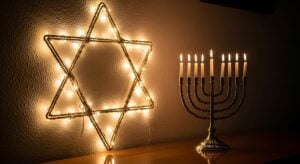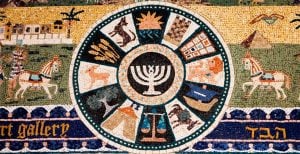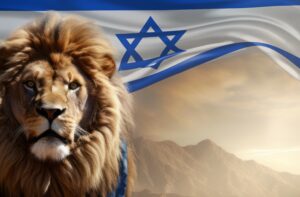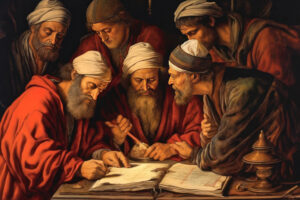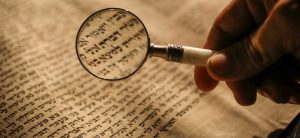Name: Vayechi
Reading: Genesis 47:28 – 50:26
Haftarah: Kings I 2:1- 2:12
Parsha Summary – Vayechi
Jacob Prepares to Die
Jacob realizes that he’s close to death, so calls Joseph to him. He asks his son to bury him with his fathers in Canaan and not in Egypt. Joseph swears it and Jacob bows down.
Jacob Blesses Ephraim and Manasseh
Joseph is told that Jacob is ill, so he takes his two sons and goes to his father, who gains strength and sits up in bed. Jacob tells Joseph that God blessed him and told him that he will father many nations and that He has given Israel to his children for eternity. Jacob tells Joseph that he will bless Ephraim and Manasseh as if they were his own children, and says that they will inherit from him in the same way as his own sons.
Joseph brings his sons close to Jacob to receive a blessing. He crosses his hands, placing his right hand (the dominant hand reserved for the older child) onto young Ephraim’s head and his left hand on Manasseh’s. Joseph tries to correct Jacob’s hands, but he refuses, saying that although he knows that Manasseh will be great, Ephraim will be even greater. Jacob tells Joseph that by blessing his sons separately, he has awarded Joseph double the inheritance of his brothers.
Jacob Blesses His Sons
Jacob summons his sons and tells them to listen to what he has to say. He blesses each of them in turn:
- Reuben is my firstborn, my strength, dignified and powerful, but he does not deserve these accolades because he slept in my bed and defiled it
- Simeon and Levi are brothers and weapons of violence and my soul will not counsel them for they slew men; curse their anger and wrath for they were fierce and cruel and they will be separated in Israel
- Judah will be praised by his brothers and his hand will be on his enemies’ necks; Judah is a lion cub who has risen from a lion; he will rule forever
- Zebulun will dwell by the sea like a harbor for ships
- Issachar is a nimble donkey who will work hard as a tiller for good, pleasant land
- Dan will judge his people (as only one tribe can); he shall be a serpent on the path that bites the heels of horses and makes the rider fall
- Gad will be trooped upon but he will troop against their heel
- Asher‘s bread will be fat and he will give royal delicacies
- Naphtali is a gazelle0like messenger; he gives eloquent words
- Joseph is a fruitful vine by a fountain whose branches run over the wall; he was dealt with bitterly but was already blessed by God and remained serene, and will remain eternally blessed
- Benjamin is a hunting wolf; he eats his prey in the morning and in the evening divides his spoils
Jacob concludes his blessings by telling them to bury him in the cave of Machpelah in the field where Abraham and Sarah, Isaac and Rebecca, and Leah are buried. He finishes speaking, lays back on the bed, and dies.
Joseph Buries Jacob
Joseph cries over his father’s body, then commands the doctors who served him to embalm his father. The embalming process takes 40 days, and the Egyptians mourn over him for 70 days. Joseph asks Pharaoh for permission to fulfill Jacob’s dying wish to be buried in Canaan. Pharoah consents and Jacob’s sons bury him in the cave of Machpelah.
The brothers fear that Joseph will hate them for what they did to him, and beg for his forgiveness and kinship. He assures them that he is in God’s place and will provide for them and their children.
Joseph Dies
Joseph lives 110 years and sees Ephraim’s grandchildren. He tells his brethren that he is dying, but that God will remember them and bring them to the land He promised their fathers. He asks that when God remembers them, they will take his bones (for reburial in Canaan). He dies aged 110 and is buried in Egypt.
Torah Takeaway
There is a concept in Judaism called middah k’negged middah – measure according to measure. It’s a kind of “Jewish karma” as it believes that every action – positive and negative – will be rewarded in kind. The episode at the end of this week’s Torah portion which sees Jacob blessing his sons and grandsons makes it hard to ignore this somewhat ambiguous concept.
When Jacob was younger, he tricked his blinded father into blessing him, the younger son, over Esau, the rightful recipient of the birthright blessing. He claimed his brother’s identity and lied to his father – twice.
We now see that when Jacob blesses his children, he curses – instead of blesses – two of his sons. Simeon and Levi do not receive their father’s blessing; instead, he calls them “vessels of violence” and curses their anger and cruelty.
There are two incidents which mark Simeon and Levi as underserving in their father’s eyes: the slaughter of all the men of Shechem at their weakest (following the circumcision that they demanded the men perform on themselves on Jacob’s apparent “orders”, while he knew nothing of the event at all). Additionally, according to the Midrash, the plot to sell Joseph and smother his prized coat with an animal’s blood was devised and initiated by the same two sons.
He who tricked his father twice was in turn tricked twice by his own children, but it goes one level further: Jacob possibly felt complicit in his sons’ heinous acts. Had Jacob simply been told Joseph had disappeared he would have sent out a search party instead of incorrectly concluding that his son was dead. Beyond this: he must have known that Joseph’s brothers despised his elevated status with their father. He nonetheless continued to show favoritism, fostering the bad feelings that lead to the duplicitous plot.
When Dinah is raped, Jacob does nothing until his sons return. His failure to act leads to the two brothers lying to the rapist and his father, offering Dinah’s hand in marriage on the condition that the entire male population of Shechem is circumcised – and the consequent mass slaughter of the men at their weakest.
It seems here that the notion of middah k’negged middah is out in force: the brothers deceive Jacob in the same way that Jacob deceived Isaac. Jacob’s curse is therefore two-fold: an acknowledgment both of his sons’ wrongdoing, and of his own role in these events. On some level, perhaps he is cursing his involvement and the way in which he behaved to his own father.

